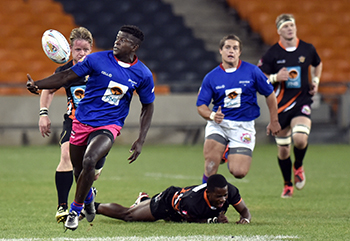Latest News Archive
Please select Category, Year, and then Month to display items
12 January 2024
|
Story Nonsindiswe Qwabe
|
Photo Sonia Small
 Since joining the UFS in 2008, Dr Grey Magaiza has worked extensively on approaches that can foster the socio-economic transformation of societies.
Since joining the UFS in 2008, Dr Grey Magaiza has worked extensively on approaches that can foster the socio-economic transformation of societies.
“The future should be one where communities can decide on their development agenda and futures. That’s the most important for me.” Dr Grey Magaiza, Deputy Director of the Centre for Gender and Africa Studies (CGAS) and Head of the Community Development programme on the Qwaqwa Campus, is passionate about capacitating communities to be agents of change and advancement. His vision for the future emphasises the empowerment of communities to take charge of their development by actively participating in decision making and the implementation of development projects that can improve their lives.
Since joining the UFS in 2008, Dr Magaiza has worked extensively on approaches that can foster the socio-economic transformation of societies. Over the years, he has crafted his research speciality into one that he is most proud of – being an interdisciplinary scientist immersed in the development of communities.
“I’m in a fortunate position of researching what I like. I say ‘fortunate’, because I’ve taken the time to understand what I’m passionate about, which is the overall field of rural livelihoods and livelihood futures – in short, community development. My research starts from an engaged university, understanding the elements that a university must use to enhance transformation and relevance to its immediate community in terms of development.”
One of the ways he has done this is by looking at social entrepreneurship as a development approach for young people in a rural setting. Through workshops with non-profit and civic organisations in Qwaqwa, Dr Magaiza has been helping these organisations to map out their needs and actively meet them through the involvement and support of external role players.
“We understand that communities are part of the national development agenda, but even that national agenda respects community knowledge and intentions and allows communities to shape their identity. A critical enabler of this is community organising. You bring back the capacity in communities to have dialogues on issues affecting them as spaces for engagement, knowledge exchange, and for people to just talk about their way forward.”
By enabling communities to define their development agenda, they can address their specific needs, challenges, and aspirations, he said. “When I look at livelihood futures, it’s quite an exciting aspect of my work – it’s like looking into a fortune tellers’ globe, because you’re not deciding for communities what they should do, but the communities themselves take those decisions.”
Mafuma aims at elusive tournament victory with Junior Springboks
2016-06-03

The University of the Free State’s Mosolwa Mafuma
recently scored five tries in the Junior Springboks’
three practice matches against a Golden Lions U20
invitation team, a Maties team, and the
South Western Districts. Photo: SASPA
He has never won a rugby tournament, so Mosolwa Mafuma has only one goal: to win the Junior World Cup as Junior Springbok in England.
Even though the 20-year-old Shimlas wing has achieved success, and it is pleasing to excel individually, he believes it is more satisfying when his team triumphs. According to Mafuma, who could just as well be an athletics star, he wants to help the South African U20 team take a different approach.
He and the prop Kwenzo Blose are players from the University of the Free State who will represent the Junior Springboks from 7 to 25 June 2016 in Manchester. The team will play the first of three group matches on 7 June 2016 against Japan in the Academy Stadium.
New approach for SA U20 team
Mafuma, who was Player of the Tournament in his first Varsity Cup in 2016, says the Junior Springboks are well prepared. “We have the skills, and the structures at the Junior Springboks are different than before. There is not just one game plan like playing with big guys. We want to try new things and have a different approach.”
It is with this team that he wishes to achieve something. “It is one thing to be able to say that you are the Player of a Tournament, but your team did not win. I have not won something at school (with St. Benedict’s Boys College in Johannesburg) or this year with the Shimlas.”
Speedster on athletics track
The speedster is one of only a few rugby players who also have a profile on the IAAF website. His fastest time in the 100 m is 10.37 seconds (a national U17 record) and 20.37 s in the 200 m.
In high school, this first-year Psychology student played rugby during winter and took part in athletics during summer. Only at the end of Grade 11 did he started focusing on rugby. “I was more of an athlete than a rugby player,” he says.
It is no coincidence that the nickname he acquired due to his speed, is Dash. His other nickname, Senkie (derived from the Afrikaans word ‘seuntjie’) he received as a child from his parents because he was such a small child.